
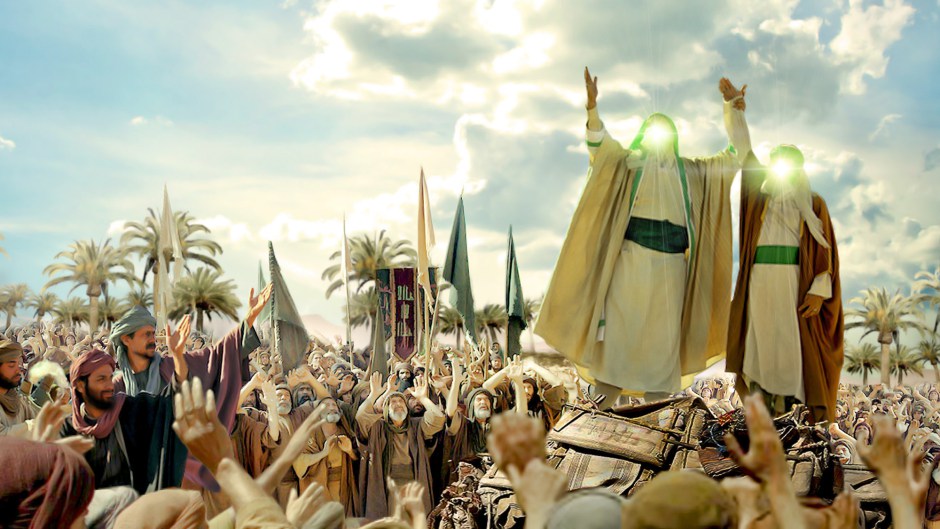
The event of Ghadir Khumm
On Dhu al-Hijjah the 18th AH (March 632 CE), Prophet Muhammad (PBUH & HP), while returning from his last pilgrimage of Hajj named “the Farewell Hajj”, stopped at Ghadir Khumm (a pond) to make an announcement to the pilgrims who had accompanied him in the pilgrimage.
Ghadir Khumm was a place where people (who were about 10 thousand in number) from different lands like Iraq, Syria, and Egypt would part ways. But before they do, Gabriel revealed to the Prophet (PBUH & HP) one of the last verses of Quran. The verse is now called the verse of al-Tabligh (propagation):
يَا أَيُّهَا الرَّسُولُ بَلِّغْ مَا أُنزِلَ إِلَيْكَ مِن رَّبِّكَ وَإِن لَّمْ تَفْعَلْ فَمَا بَلَّغْتَ رِسَالَتَهُ وَاللَّهُ يَعْصِمُكَ مِنَ النَّاسِ إِنَّ اللَّهَ لَا يَهْدِي الْقَوْمَ الْكَافِرِينَ
O Messenger! Communicate that which has been sent down to you from your Lord, and if you do not, you will not have communicated His message (the whole message of Islam), and Allah shall protect you from the people. Indeed Allah does not guide the faithless lot. (The Holy Quran 5:67)
After the verse was revealed to the Prophet (PBUH & HP), he ordered the caravan to stop and ordered those who have passed Ghadir Khumm return and wait until those who had not yet arrived there join them. (1)
After performing the noon prayer, the Prophet (PBUH & HP) made a speech that now is one of the most famous speeches of the Prophet known as Ghadir sermon. Zeid ibn Argham, one of the famous companions of the Messenger (PBUH & HP) said:
“Once, the Messenger of Allah (PBUH & HP) made a speech for us near a pond named Ghadir which is between Mecca and Medina. Firstly, he praised Allah and talked about God and then said: ‘O people! I’m only a human and it is possible that the Apostle of my God (The angel of death) comes to me and I shall accept his invitation (my life ends) and I am leaving you al-Thaqalayn (two great things). The first one is the book of Allah (Quran) in which is guidance and light so follow it and hold fast to it.’ he advised us about the Book and encouraged us to follow it. Then the Prophet (PBUH) said: ‘and (the second one is) my close family. By Allah, I advise you (to follow) my family, By Allah, I advise you (to follow) my family, By Allah, I advise you (to follow) my family’” (2)
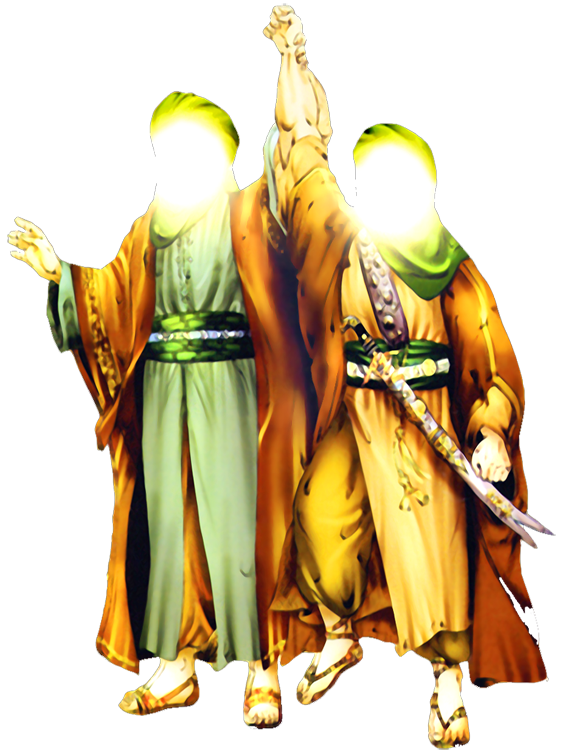
The Hadith above is known as “al-Thaqalayn”. It is one of the most famous Hadiths of the Prophet (PBUH & HP) which indicates that the most important things which the Prophet has left for all Muslims are Quran and the family of the Prophet.
Bara’ ibn Azib, another famous companion of the Messenger, narrates the continuation of the Hadith:
“Then the Prophet raised Ali’s hand (so that all people can see it) and said: ‘don’t you know that I am more deserved to the leadership of the believers than themselves?’. People said: ‘yes, we know’. The Prophet said again: ‘don’t you know that I am more deserved to be the leader of every believer than themselves?’. People said: ‘yes, we know’. Then the Prophet said: ‘anyone whose Mawla is me, then Ali is his Mawla. O God! Be friends with his friends and be enemy of his enemies’. Then, Umar ibn Khattab (the second Caliph) met Ali and told him:
‘Congratulations to you, Congratulations to you, you just got the Mawla of every believer, men or women’”
Arna’oot, one of the most important religious Sunni researchers admits that this historical record is right and trustable. (3)
What does the word “Mawla” mean?
The word “Mawla” in Arabic language has lots of meanings. Shias and Sunnis disagree on the meaning of the word used in this hadith.
Sunni viewpoint
Sunni scholars mostly refuse to believe that the word “Mawla”, used in the Hadith, means “Leader” or “Prior in making decisions for somebody”. They rather suggest it means “friend or helper”. They argue that this word is never used in this meaning (Leader).
Shiite viewpoint
Shiites, in reply to Sunni scholars, say that this world have actually been used in this meaning (“the prior”) and some Sunni scholars have admitted that. (4) also, some experts in Arab literature admitted so too like Ghiyath Barghuth, Ajjaj (5), Yahya ibn Ziad al-Farra, Akhfash and so forth. (6)
To prove that the word Mawla in this Hadith means “Leader” and not “friend”, there are many evidences but we mention just one in this text.
The congratulation of Umar ibn Khattab:
The congratulation of Umar ibn Khattab can be a good evidence to prove that “Mawla” here doesn’t mean “friend”. Because, as we said before, Umar says: “Congratulations to you, you just got the Mawla of every believer, men or women” while Imam Ali was the friend of every believer before the Ghadir event, and it doesn’t make sense that he just got the friend of believers in there.
Ghazali, one of the most important reflective Sunni scholars in this regard, says:
“(After the sermon) Umar said: ‘Congratulations O Aba al-Hassan (Imam Ali (AS) ), you just got my friend and every believer’s friend’. So this shows submission and satisfaction (that Imam Ali is the successor of the Prophet) but after this event, due to his desire and love for power, he made himself Caliph and leader” (7)

Revelation of the Ikmal verse
People had not scattered yet, when Gabriel one more time came to the Prophet and revealed another verse to him:
الْيَوْمَ يَئِسَ الَّذِينَ كَفَرُوا مِن دِينِكُمْ فَلَا تَخْشَوْهُمْ وَاخْشَوْنِ الْيَوْمَ أَكْمَلْتُ لَكُمْ دِينَكُمْ وَأَتْمَمْتُ عَلَيْكُمْ نِعْمَتِي وَرَضِيتُ لَكُمُ الْإِسْلَامَ دِينًا
Today the faithless have despaired of your religion. So do not fear them, but fear Me. Today I have perfected your religion for you, and I have completed My blessing upon you, and I have approved Islam as your religion.
The narrators of the Hadith
The Hadith is that which is frequently narrated by different people and historians that no one can deny its authenticity.
The family of the Prophet i.e. Imam Ali himself, Lady Fatima, Imam Hassan and Imam Hussain are among the narrators of this Hadith. Also many of the companions of the Messenger narrated this Hadith. Kattani, one of the Sunni scholars, says that about 30 companions of the Prophet narrated this story including: Umar ibn Khattab, Zeid ibn Argham, Abi Hurairah, Sa’d ibn Waghas and etc. (8)
Due to this fact that this Hadith is so frequently narrated, it is called “Mutavatir”, meaning that this Hadith is undeniable.
Eid al-Ghadir
Shi'as have always regarded the Day of Ghadir as one of the greatest Eids and this day is known to them as Eid al-Ghadir. Imam Sadiq (AS) says that the Eid al-Ghadir is the greatest Eid of Allah. Its name in skies is “the day of Promise” and in the earth “the day of Covenant”. (9)
Shiites believe that this day was the day that Imam Ali (AS), our first Imam, was officially announced to be the successor of the Prophet (PBUH & HP). So this day is a great holiday for them and fasting in it is so recommended. In this day, Shiites go to the house of Seyyed people -the descendants of Imam Ali and Lady Fatimah- and congratulate them. In return, Seyyed people give them gifts. It is highly recommended to conduct parties in this day and give food to the needy ones.
For more information about Ghadir Khumm, you can read the book al-Ghadir, by Allamah al-Amini (Arabic).
Resources
- At-Tafsir, al-Ayyashi, vol.1, Pg.332
- Sahih al-Muslim, vol.4, Pg.1873
- Musnad ibn Hanbal, published by ar-Risalah, vol.30, Pg.430
- Sharh al-Maqasid, al-Taftazani, vol.5, Pg.273
- Al-Shfi, Sharif al-Murtaza, vol.2, Pg.270
- At-Tafsir al-Kabir, Fakhr ad-Din ar-Razi, vol.29, Pg.227
- Sir al-A’lamin, al-Ghazali, vol.1, Pg.18
- Nazm al-Mutanathir, al-Kattani, vol.1, Pg.194
- Vasa’il ash-Shiah, Sheik Hurr al-A’meli, vol.5, Pg.224
Share This Article
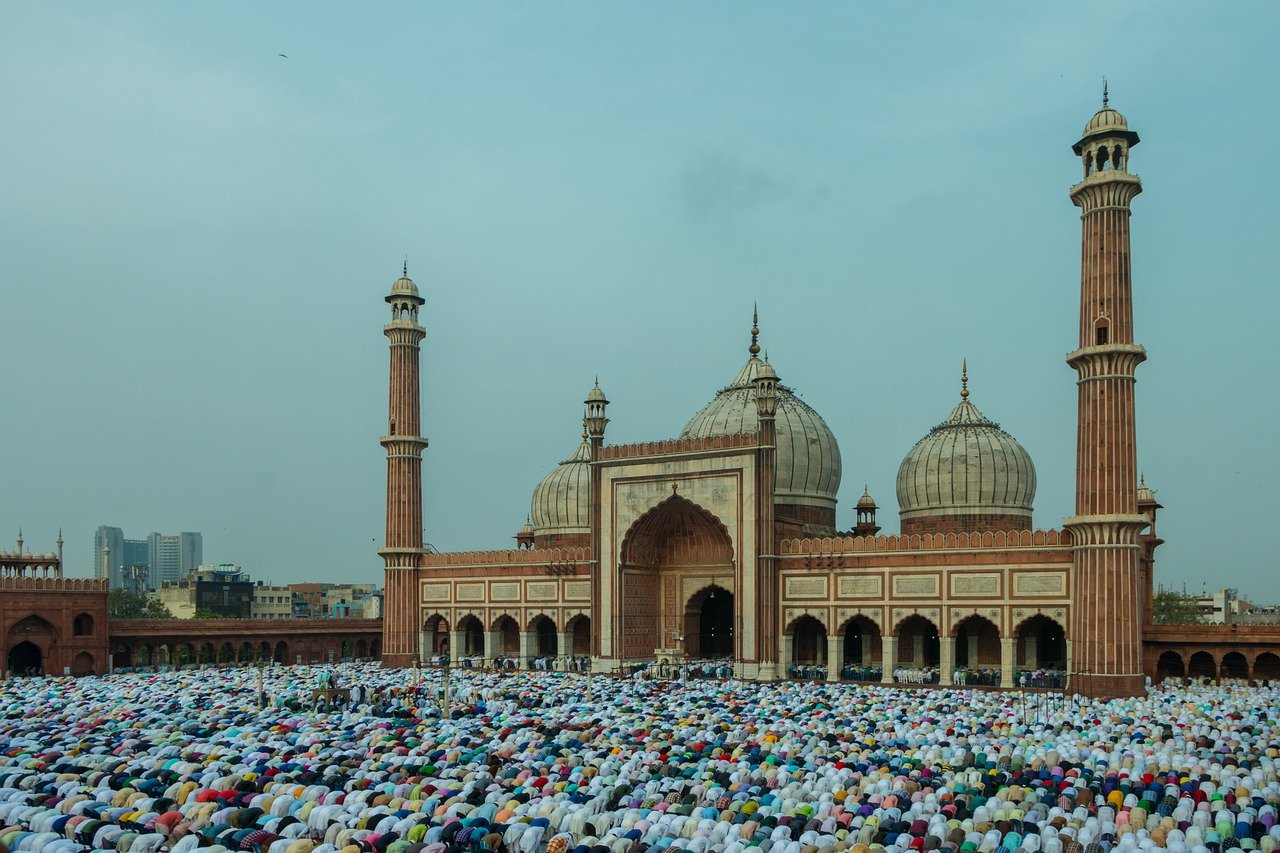
Eid al Adha, The Feast of Sacrifice
Eid al Adha (or Dhuha) is one of the greatest eids of Islam. It is a feast of love, sacrifice, and submission to the will of Allah (s.w.t). Celebrated on the 10th of Dhul Hijjah, the last month of the Islamic calendar, it is the time of the year where Muslims from all over the world gather for the annual ritual of Hajj and mark the end of Hajj by sacrificing a camel, a cow or a sheep. Those Muslims who could not make it for Hajj, sacrifice these animals and distribute the meat and other gifts among the poor, their family and friends.
There are many recommended (not obligatory) rituals and practices to be performed on the day of Eid al Adha, some of them are as follows:
-Doing Ghusl (ritual bath)
-Eid Prayer, either in a congregation or individually
-Reciting the Ziarat of Imam Husain (AS), the third infallible Imam
-Sacrificing either a camel, cow, or sheep. Sacrifice is obligatory for those performing Hajj and recommended for those not performing Hajj
-According to Islamic laws, it is forbidden to fast on this day
History of Eid al Adha
Prophet Abraham (PBUH) was a true embodiment of the verse from the Holy Quran: “Do the people suppose that they will be let off because they say, ‘We have faith,’ and they will not be tested? Certainly, We tested those who were before them. So, Allah shall surely ascertain those who are truthful, and He shall surely ascertain the liars.” (29:2)
Prophet Abraham (PBUH) was a great Prophet of Allah (SWT) who is greatly celebrated in the Holy Quran. He is one of the Ulu –l-Azm (Arch) prophets. Allah (SWT) calls him his friend in the Holy Quran (4:125). The intended sacrifice of this holy prophet is greatly eulogized in the Holy Quran and the prophetic traditions. Abraham is especially famous for the numerous ways God tested him; especially the tough tests of leaving his wife Hagar and his firstborn son Ishmael (2:124) and bringing his son to a special place as an offering to God (37:100-113).
The story of Prophet Abraham sacrificing his son is mentioned in the Holy Quran as follows:
“My Lord! Give me [an heir], one of the righteous.” So We gave him the good news of a forbearing son. When he was old enough to assist in his endeavor, he said, ‘My son! I see in dreams that I am sacrificing you. See what you think.’ He said, ‘Father! Do whatever you have been commanded. If Allah wishes, you will find me to be patient.’ So, when they had both surrendered to Allah’s will, and he had laid him down on his forehead, We called out to him, ‘O Abraham! You have indeed fulfilled your mission! Thus, indeed do We reward the virtuous! This was indeed a manifest test.’ Then We ransomed him with a great sacrifice, and left for him a good name in posterity: ‘Peace be to Abraham!’ Thus, do We reward the virtuous? He is indeed one of Our faithful servants.” (37:100-110)
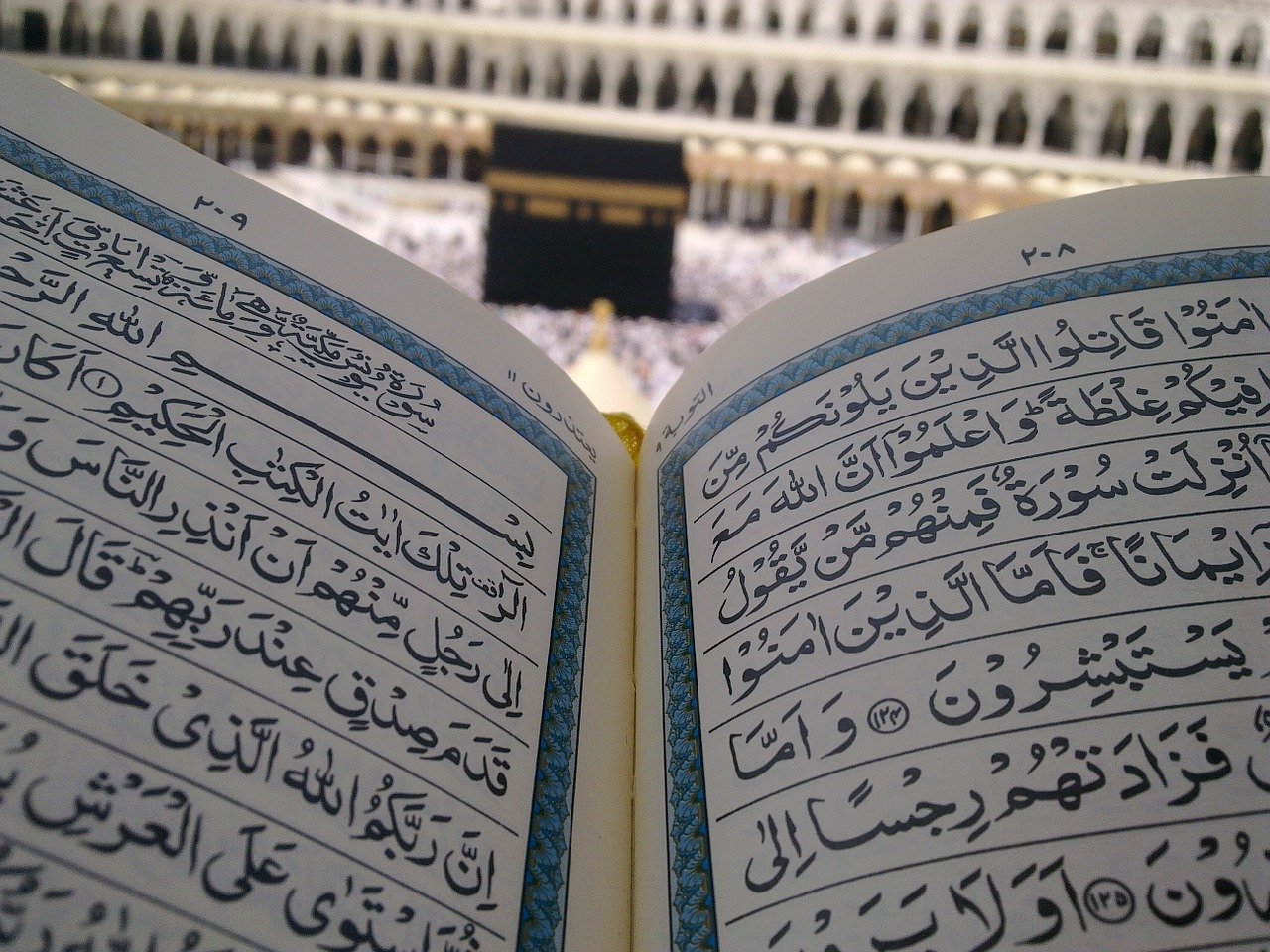
The Holy Quran gives us a very clear picture of the incidents that unfolded with Prophet Abraham (PBUH). It tells us that Prophet Abraham (PBUH) prayed for a righteous heir and Allah (SWT) answered his prayers. But after a few years, Allah (SWT) orders his Prophet to sacrifice his only son and both Prophet Abraham (PBUH) and Prophet Ishmael (PBUH) agree to submit to the will of Allah (SWT). It was a test for Prophet Abraham (PBUH) as well as his son Prophet Ishmael (PBUH), who emerged victorious from this test. Thus, leaving a legacy of complete submission to the will of Allah (SWT), a submission that calls for sacrificing everything you have to gain the pleasure of your beloved creator. It is this humble and pure submission of Prophet Abraham (PBUH) that makes this great prophet a ‘good example’ for us. (60:4).
The sacrifice of Prophet Abraham is not a fairy tale to be read to our children before going to sleep, it is a story that has the potential to make human beings build a lasting relationship with Allah (SWT). If we truly trust in Allah (SWT) and reach a position where we readily sacrifice everything in the way of Allah, we can proudly claim to be inheritors of the legacy of Abraham, a friend of Allah (SWT). But for us to reach that position we need to first ask ourselves: who is our Ishmael? Is it my child, my spouse, my property, wealth, job, position or my desires?
References
- Quran Translations, Ali Quli Qara’i
- Recommended rituals and practices on the eve of Eid and the day of Eid: Dua for EID ul Adha Night and Day (duas.org) (these recommended acts can also be found in Mafatih Al-Jinan under the section of aamaal for Eid)
- Exegesis of Surah Saaffat, Tafseer Nemuneh, Ayatollah Makarem Shirazi (Farsi)
Read More

14 Tips to Get Prepared for Hajj
Another year has come around and another Hajj (holy pilgrimage) period has started for Muslims from all around the world. Those who have decided to take part in this year’s Hajj may have already made some preparations for this holy journey or are in the process of gathering their stuff and making arrangements. But even when we think we are more than ready, we find ourselves saying: “Oh, I forgot that!” right on the way to the airport!
14 Tips to Get Prepared for Hajj, the best journey of your life and never feel unprepared
Before You Decide
Hajj is a journey that every Muslim is required to participate and loves to do so. However, according to Islamic principles, before deciding to take part in this occasion, you should ask yourself these three questions:
1. Can you afford Hajj financially? [i] (This includes buying tickets, hotel expenses, and your expenses during your stay in Mecca and Medina, etc.)
2. Are you physically able to perform Hajj rituals? [ii]
3. Is the route to Mecca and Medina (to which I recommend you to travel and have a plan for it) safe and open? [iii]
If you are positive about all the above questions, you are considered to be Mustati (i.e., obliged to take part in Hajj) [1]. Then you can start preparing yourself for this journey. If not, don’t get disappointed. Pray to Allah to give you the necessary abilities for participating in the next year Hajj.

Let’s Get Ready
1. Know your Intention
Hajj is first and foremost a spiritual journey. A journey to the depth of your soul. If you don’t know why you are taking all these difficulties, then your effort will lose its meaning. Like any other action in Islam, you should perform Hajj with the intention of Allah’s satisfaction and surrendering to His will.
2. Find a Reliable Travel Agency
Search for a travel agency which offers various Hajj packages and consult with them about the necessary documents you need in order to ask for visa from Saudi Arabia. You can also visit the website of Saudi Arabia‘s Ministry of Hajj for more information.
You can also ask your friends or acquaintances who have taken this journey before about the best travel agency for Hajj. Or you can visit the nearest mosque or Islamic center in your city, and ask the Muslims there about travel agencies.
Either way, make sure you know about the date, duration, accommodation, your representative there, and the type of transportation your agency offers within Mecca and to Medina. You can find some useful questions to ask from travel agencies on this website.
3. Get Some Maps and Information about Mecca and Medina
The best way is to google it. Try to have a clear view of all the places you will visit during Hajj such as Mina, Arafat, etc. You can download a map and see the locations. Also make sure you check the weather, to know which clothing best suits you. Typically Saudi Arabia is hot during Hajj rituals so be ready for a hot and sunny journey!
4.Visit a Doctor and Get Necessary Medicines
Since Hajj rituals take much energy and need a healthy body to complete the tasks before everything visit your doctor and have a check-up. If there are any medicines that you should use during your journey, make sure you get the prescription from the doctor and buy the medicines beforehandedly.
5. Go Shopping!
Hajj is a one-month journey, so you will need many things during this time. Here is a list of some necessary or useful things to pack in your baggage for Hajj:
Clothing and Accessories:
Ihram [iv]
An extra set of clothing (white underwear, trousers, hijab, white socks, etc.)
Waist Pouch (Fanny Pouch)
slippers (flip-flops, thongs), sneakers
towels (2 large, 2 small)
Suitcase
elastic eye-glass holder
sunglasses (or clip-on sunshades)
travel alarm clock
Toiletries / Hygiene:
Medication [v]
A scent-free lotion or Vaseline
A scent-free sun protection free
A medical face mask
toothbrush and toothpaste
scent-free soaps
disposable razors
toilet paper
shaving cream
small mirror
comb
napkins
small shampoo bottle
deodorant
some plastic bags
nail clipper
small scissors
a sheet
inflatable pillow
Documents and Money:
Saudi Arabia’s Money (Rials)
Passport
Ticket
Guidelines for Hajj
pen, pencil, notebook
Religious stuff:
A praying mat
A small copy of Quran, prayer and Dua books, Tasbeeh
Food:
Foods/Snacks/Water (some light food, like biscuits, cereals, nuts, dried fruits, etc.)[vi]
can opener
6. Stay in Shape
During Hajj rituals you will walk a lot. You should walk around Kaaba, walk the distance between Safa and Marva, etc. So, it’s important to have enough strength and be physically in good condition to be able to keep up with this endeavor.
Try to do some exercises and eat healthier food sometime before embarking on your journey to Mecca.
7. Write your Will
Yes, you need to write a will! Even if you are 25! But don’t worry it doesn’t mean that you won’t come back home. It’s just a way to make sure you have arranged all your worldly concerns properly, and you can start a spiritual journey with light and free soul. Make sure you consult with your lawyer after writing your will and legalize it.
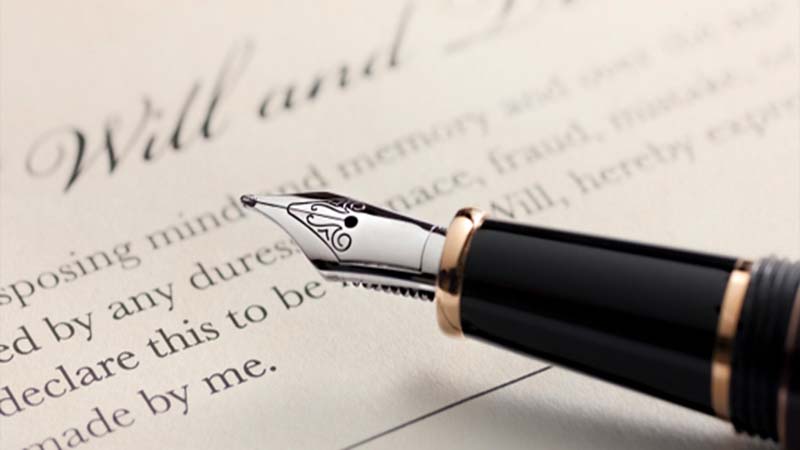
8. Find a Proper Way of Communication with Your Family Back Home
You remember what happened at Mina two years ago, right? Many families were worried about their children, husbands, wives, etc. but they couldn’t reach out to them. So, it is very important to predict a proper way of communication with your hometown. This can be a Saudi Arabia SIM card or even any other SIM Cards that work abroad. You can also ask the hotel staff for their WIFI information.
9. Know What You Want to Do and Why
Have an idea of the actions you need to perform during Hajj. Salam Islam has a complete guide to these rituals: Hajj, The Holy Pilgrimage. You can also buy a booklet or download an ebook about these rituals to have it with you during the journey. Then, understand the reason behind those actions. You can read our Philosophy of Hajj Rituals, to get a better grasp of the reason behind these rituals. This way, you will remember them more easily.
10. Work on Your Time Management
Most of the rituals during Hajj are time-bound. For example, you have only a few hours to perform stoning Jamarat. Also, the process of Ihram and actions in the Arafat need to be done during a certain time. So, you need to work on your time management so that you won’t lose any of those actions.
11. Work on Your Patience
Hajj is not an easy journey. It is not a summer vacation. It is an Islamic obligation and a life-changing journey. During this time, you will face many difficulties, and sometimes you may find yourself overwhelmed by the amount of interesting yet difficult physical activities or prayers you are required to do.
However, think of it as a chance to be purified and as an opportunity to strengthen your patience. For, every precious reward comes after consistency and patience.
12. Respect the Differences
As you are well aware, Muslims are not just of a certain nationality or country. In every country and with every nationality, you can find people who believe in Islam. Hajj is a chance for this huge community to gather together and be unified despite their differences.
So, during your journey, you may encounter people with different colors, languages, outfits, etc. Try to be respectful and modest toward everyone, no matter where they come from or how they look.
13. Learn Group work
During Hajj you might have to join a group. And you will be with them every day of this one month period. You will accompany them in every ritual and action. So, try to prepare yourself for more cooperation and sacrifice. Sometimes you may need your roommate’s help, and in return, he/she may need yours. Try to be nice and generous.
14. Try to Be Better than Before
After all, you want to participate in Hajj for a good reason: Self-awareness. This is a journey to find out who we are and why we are here. So, practice on the good in you and try to improve them. Be the best you can be. And prove that you deserve Allah’s invitation.
Notes:
[i] One of the requirements for Hajj to be obligatory for a Muslim is financial ability – i.e., you have enough money to support yourself and your family on your journey [1].
[ii] Another requirement for performing Hajj is physical ability- i.e., Hajj is not obligatory for the sick, the old or those who are either unable or would face severe hardship [1].
[iii] Another requirement for obligatory Hajj is Sirbi ability - i.e., the route is open and safe [1].
[iv] To buy Ihram you can follow these links:
https://www.amazon.com/Ahram-Ihram-Towels-Hajj-Umrah/dp/B005IHH2VK
https://www.amazon.com/Ihram-Thick-Towels-44x90-Inches/dp/B009HEPVCC
http://www.ebay.com/itm/2-Piece-Ihram-Ehram-Ahram-White-Towel-Adult-Size-Cloth-Waist-Belt-Hajj-Umrah-/121445719313
https://www.amazon.com/Hajj-Ihram-Women-Size-XL/dp/B0108VELQ4
[v] Make sure about the kinds of medications you are allowed to have with you according to Saudi Arabia’s airport costume.
[vi] Make sure about the rules of Saudi Arabia with regard to carrying food in your packages at the airport.
References:
- Hajj, The Holy Pilgrimage
Read More

